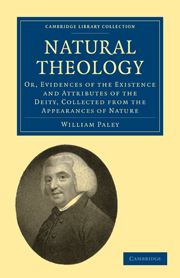 Natural Theology
Natural Theology Published online by Cambridge University Press: 07 September 2010
The proof of the divine goodnefs refts upon two proportions, each, as we contend, capable of being made out by obfervations drawn from the appearances of nature.
The firft is, “that, in a vaft plurality of inftances in which contrivance is perceived the defign of the contrivance is beneficial.”
The fecond, “that the Deity has fuperadded pleafure to animal fenfations, beyond what was neceffary for any other purpofe, or when the purpofe, fo far as it was neceffary, might have been effected by the operation of pain.”
Firft, “in a vaft plurality of inftances in which contrivance is perceived, the defign of the contrivance is beneficial.”
No productions of nature difplay contrivance fo manifeftly as the parts of animals; and the parts of animals have all of them, I believe, a real, and, with very few exceptions, all of them a known and intelligible, fubferviency to the ufe of the animal. Now, when the multitude of animals is confidered, the number of parts in each, their figure and fitnefs, the faculties depending upon them, the variety of fpecies, the complexity of ftructure, the fuccefs, in fo many cafes, and felicity of the refult, we can never reflect, without the profoundeft adoration, upon the character of that Being from whom all thefe things have proceeded: we cannot help acknowledging, what an exertion of benevolence creation was; of a benevolence, how minute in its care, how vaft in its comprehenfion.
To save this book to your Kindle, first ensure [email protected] is added to your Approved Personal Document E-mail List under your Personal Document Settings on the Manage Your Content and Devices page of your Amazon account. Then enter the ‘name’ part of your Kindle email address below. Find out more about saving to your Kindle.
Note you can select to save to either the @free.kindle.com or @kindle.com variations. ‘@free.kindle.com’ emails are free but can only be saved to your device when it is connected to wi-fi. ‘@kindle.com’ emails can be delivered even when you are not connected to wi-fi, but note that service fees apply.
Find out more about the Kindle Personal Document Service.
To save content items to your account, please confirm that you agree to abide by our usage policies. If this is the first time you use this feature, you will be asked to authorise Cambridge Core to connect with your account. Find out more about saving content to Dropbox.
To save content items to your account, please confirm that you agree to abide by our usage policies. If this is the first time you use this feature, you will be asked to authorise Cambridge Core to connect with your account. Find out more about saving content to Google Drive.